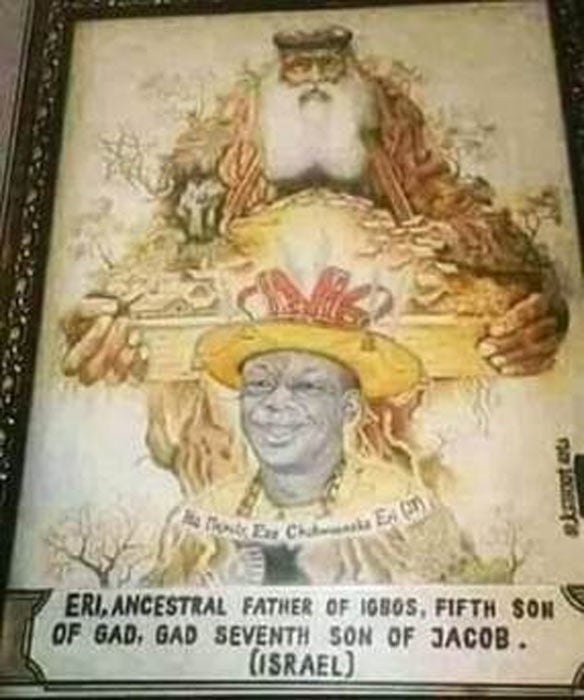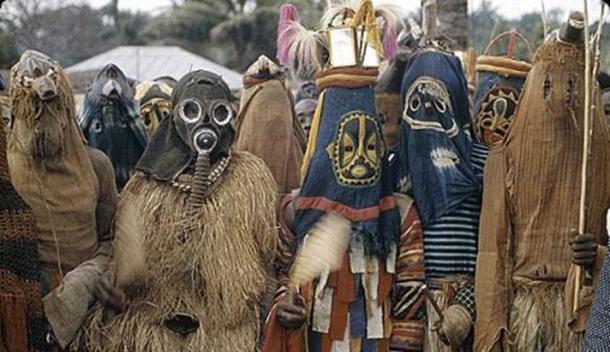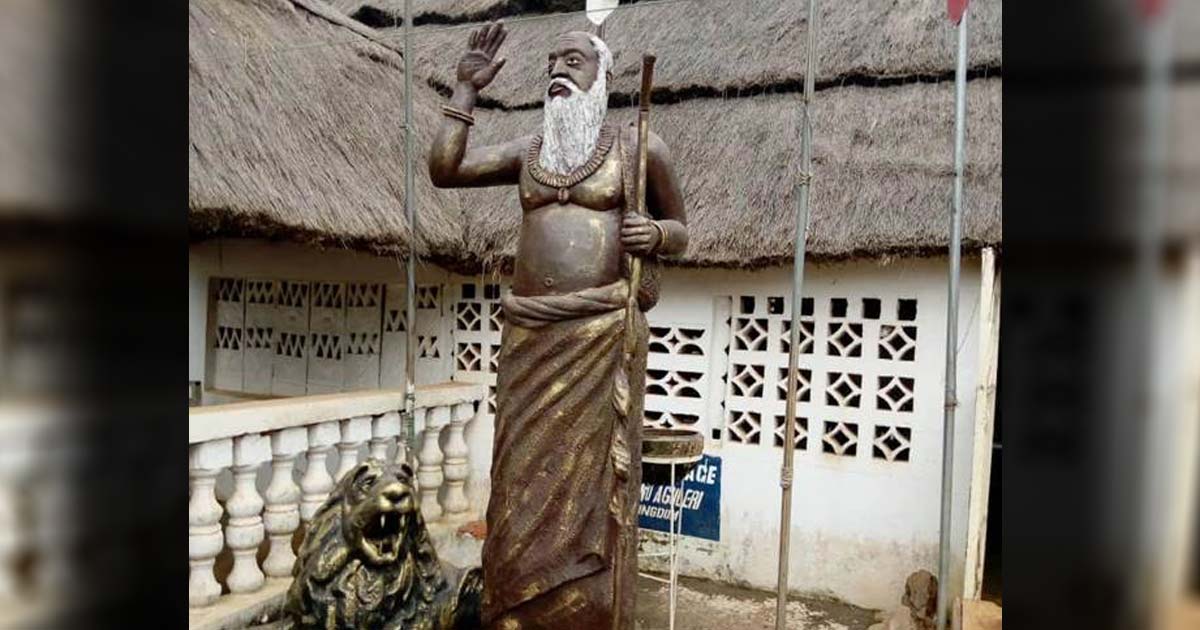Eri: Mythical King and Founder of the Igbo
The Igbo are a large ethnic group located around Nigeria with a fascinating origin story. Having lived throughout northwestern Africa for many years, the Igbo’s origins can be traced back nearly 6000 years. Because of their long existence, many subgroups of the Igbo population believe that Igbo lineage can be traced back to an ancient king named Eri, who is often referred to by the Igbo as a “sky being” with supernatural or god-like powers in addition to his monarchic position.
The true history of the Igbo, while not entirely clear, is fascinating due to its oral ties back to Eri. Archaeological evidence supports the existence of an early king that likely may have been Eri or a close descendant of him, but there is no real evidence of the Eri being a “sky being” or having supernatural abilities. The history of the Igbo people outside of the creation story of Eri at times overlaps with these oral legends, leading some to consider that there may be more truth behind the stories than previously thought. Was this Eri simply an ancient king, or is it possible that he was something even more powerful?

A picture of an Igbo man with facial scarifications, known as Ichi, taken in the early 20th century. (Public domain)
The Igbo People: A Brief Synopsis
The origins of the Igbo people have been traced back to between 5000-6000 years ago, thanks to the discovery of ancient Igbo pottery estimated to be from around 3000 BC. This pottery was found in Nsukka and Afikpo, distinct Igbo regions of Nigeria in the 1970s. This indicated to archaeologists and historians that the Igbo people had not only existed for thousands of years, but that their migration had likely not moved outside of Nigeria or northwestern Africa during all this time. Beyond pottery, evidence of ancient Igbo iron smelting from both 750 BC and 2000 BC were found in southeastern Nigeria in the sites of Opi and Lejja, respectively. This evidence not only confirmed the age of the Igbo people, but also revealed that ancient Igbos had developed some technology more advanced than that in other countries.
- The highly advanced and mysterious ancient civilization of the Nok
- The Rich Mythology and Megalithic Culture of the Ancient Berbers, Lords of the Desert
The Igbo people are related to other African ethnic groups including the Yoruba, Igala, and Idoma. Linguists claim that the Niger-Congo ethnolinguistic family, which these groups comprise, is the oldest ethnolinguistic family in existence. Though their languages are all connected, the separation of Igbo from the rest of the groups in this ethnolinguistic family occurred approximately 6,000 years ago, marking the official origin point of the Igbo culture. After this separation, the Igbos focused on smelting and farming to make their living and continued participating in ancestor worship before later influence from European missionary work.

King Eri, ancestral father of the Igbos, fifth son of Gad, seventh son of Jacob, Israel. (Biafra News)
Eri: Mythical Spirit or Biblical Character?
Eri is believed to be the father of the Igbo people, and the very first Igbo in existence. His legendary origin story begins with Eri coming down to Earth from the sky after being sent down by Chukwu, the ultimate deity of the Igbos. Eri then took charge of fixing the Earth from a watery wasteland into a thriving paradise. He requested Chukwu’s help with this, and Chukwu responded by sending other supernatural beings to help fix the Earth, such as Awka the blacksmith who dried the marshy land. Eri helped establish and order the people of Anambra, a state in the southeastern area of Nigeria.
Though this is the most widely accepted version of how Eri came to Earth, others believe that Eri was one of the seven sons of Gad, who was one of the 12 sons of Jacob in the Bible. These references can be found in Genesis 46:15-18 and Numbers 26:16-18. It is believed that Eri was a high priest during the reign of Joseph. Just before the impending exodus of Israelites from Egypt, he fled with a group of his closest comrades to the Ezu and Omambala Rivers, which are both found in Anambra. Once arriving at this place, Eri made it a home for his comrades and descendants to thrive.
Once in Anambra, it is said that Eri married two wives: Nneamaku and Oboli. Nneamaku bore him five children, which were Agulu (founder of Aguleri), Menri (often shortened to Nri, founder of the kingdom of Nri), Onugu (founder of Igbariam), Ogbodulu (founder of Amanuke), and Iguedo (a daughter who bore the founders of five other regions). Oboli bore him one child, Onoja, who became the founder of the Igala Kingdom in Kogi. In addition to being the father of all Igbo, it is believed that Eri was the founder of the Umunri and Umueri clans, which flourished into the most influential dynasties in northwestern Africa at that time.
The story of Eri does not end after his death. His legacy is continued on through his son, Nri. In the mythical folktale, Nri attempted to appease Chukwu for food for their people. In return Chukwu ordered him to kill his first son and daughter and bury them in separate graves. 12 days after their burial, yam and taro began to grow out of their graves to feed the community. He continually used this method by also sacrificing and burying male and female slaves, which produced more food for his people. Some sources say Nri also shared this food with people of nearby towns in exchange for other privileges provided by Chukwu.
- Oshun: African Goddess of Love and Sweet Waters
- Does latest dating of camel bones reveal inaccuracy in the Bible?
Outside of the folktale, archaeologists have found some artifacts from ancient burials that suggest that Nri first started impacting the Igbos around the 9th century. It is believed that the legends of Eri and Nri were influences for upcoming kings, who were called Eze Nri (King of Nri). According to oral Igbo history, the first reign by an Eze Nri occurred sometime between the 11th and 13th centuries. Historian E. Elochukwu Uzukwu claims that each new king traces his lineage back to Eri and Nri as part of his royal initiation and as a show of his commitment to the role of the Nri king. Their ability to trace their lineage back to them often stems from their ancestors belonging to either the Umunri or Umueri clans, which as previously stated, were founded by Eri.

Igbo religion varied with each community with similar musical instrument motifs and strong connections with atilogwu sorcery or witchcraft. (Obindigbo)
Igbo Religion: How Impactful was Eri?
It is important to note that while many Igbo communities have similarities, each has its own distinct differences that make it unique. Because Igbo communities used to be so separated, each Igbo region has its own architectural building style, music, and primary religion. There is no single Igbo art style, as each region’s art is unique to that specific community. Igbo communities do share similar instrument styles, such as the ubu (a percussion instrument designed from a jug), the ekwe (a percussion instrument formed from a log), and the ogene (a forged iron handbell). Though these instrument types are shared, the dance styles of each region vary, with the most common being atilogwu, which translates into “has magic, as in sorcery or witchcraft.”
Tracing back to Eri and his influence as the father of all Igbo, the primary religion amongst Igbo communities is Odinani. Odinani refers to the religious belief that Chukwu is the almighty god, and that he sent Eri down as a supernatural being to create the Igbo people and their homeland. Chukwu translates into “great spirit,” and it is believed that he ultimately created the Earth and everything on it. Odinani Igbos believe the universe has four distinct parts: creation, supernatural deities, spirits, and the world.
In addition to worshiping Chukwu, Igbo also worship minor deities called Alusi. Each Alusi has its own purpose and can provide specific blessings. If an Alusi is seen as no longer needed or becomes aggressive, the Igbo will dispose of it. In addition to Alusi, each Igbo has a specific Chi, or guardian angel, that is assigned to them at birth to help them pursue their destiny. Rather than an afterlife, worshipers of Odinani believe in reincarnation, and even believe that new babies will show signs of their prior life’s identity through their body language.
Beyond Odinani, many Igbos have converted to Christianity since the 19th century. In 1857, European colonization reached Nigeria and Christian missionaries were able to convince some Igbos to convert to their religion by building churches and Christian schools to teach Igbo youth Christian values. Though Christianity is not the predominant religion amongst Igbo communities, the Igbo have converted to Christianity more than any other ethnic group in Africa. In addition to Christianity, there are some Igbos that practice Judaism, as they believe they are descendants of Jacob and the lost tribe of Israel.

A family portrait of an Igbo family in traditional attire. (Jerry Emeka Obi / CC BY-SA 4.0)
A Glimpse at the Igbos Now
Modern Igbos did not always have the strong sense of community they do today. In the last several hundred years, Igbos traditionally were a part of independent communities that had their own traditions, beliefs, and ways of life, even if many of these overlapped with one another. It was not until the 20th century that Igbo communities began to come together and unite as one strong ethnic group in the face of European colonization. Though Igbo communities still have their differences from one another, more similarities are now being identified amongst these communities.
Most Igbos make a living through farming various crops that are common in the region. Yams, taro, cassava, beans, corn, and more are all common crops to be grown and sold throughout Nigeria. Interestingly, men take a specific interest in yam farming, while women tend to focus on the other crop types. Others raise livestock for food, clothing, and religious sacrificial purposes. In addition to their crops and livestock, the Igbo community is known for their export of palm fruit, oil, and kernels.
- The Rulers of Ife: The Traditional and Adaptive Roles of the Ooni
- 1000-year-old Glass Beads Provide First Evidence of Glassmaking Development in Sub-Saharan West Africa
In recent decades, the Igbo people have invested further in education and literacy, which has led to an increase in civil servants and businesses in southeastern Nigeria. This increase in businesses has helped to increase tourism to the area and has brought great improvements to Nigeria’s economy. Igbo women in particular are significantly involved in both trade and politics in the region, while men remain primarily focused on farming and building. Most regions do not have one set ruler, but instead rely on the work of many for their communities to function.
In recent years, Igbo rulers have placed more of a focus on uniting all Igbo communities across Nigeria. The current Eze Eri shared in 2019 that while the Igbos are working hard to embrace modernization, they do not want to forget their past, particularly regarding Eri traditions. He also made a call to all Igbo communities during the Eri World Cultural Festival at a time of political strife, asking them to come together in peace, as it is clear they have more similarities than differences. With an increase in traditional Igbo and Eri festivals throughout Nigeria in recent years, it is clear that the Igbos are in agreement: they are one.
Top image: A statue of Eri, the mythical founding king of the Igbo people of northwestern Africa. Source: TheGuardian, Nigeria
By Lex Leigh
References
The Editors of Encyclopedia Britannica. 2020. Igbo. Encyclopædia Britannica. Available at: https://www.britannica.com/topic/Igbo
Daily Trust. 2019. Eri Festival: Igbo return to ancestral home to rekindle tradition. Available at: https://dailytrust.com/eri-festival-igbo-return-to-ancestral-home-to-rekindle-tradition
Vanguard News. 2020. Eri, the Igbo Testament of Black History. Available at: https://www.vanguardngr.com/2020/01/eri-the-igbo-testament-of-black-history/
Google. n.d. Eri. Available at: https://artsandculture.google.com/entity/eri/m04m_ctw?hl=en
University of Iowa. n.d. Igbo - Art & Life in Africa - The University of Iowa Museum of Art. Available at: https://africa.uima.uiowa.edu/peoples/show/Igbo
Kirch, P. V. 1986. Island societies: Archaeological approaches to evolution and transformation. Cambridge University Press.
Nwabufo, F. 2021. Ndi Igbo stand for One Nigeria. Available at: https://www.thecable.ng/ndi-igbo-stand-for-one-nigeria
Oduah, C. 2013. Nigeria's Igbo jews: 'lost tribe' of Israel? Available at: https://www.cnn.com/2013/02/01/world/africa/nigeria-jews-igbo/index.html
Onyinye, W. 2021. Eri: The father of the Igbo people. Available at: https://guardian.ng/life/eri-the-father-of-the-igbo-people/
Onyinye, W. 2021. Eri: The father of the Igbo people. Available at: https://guardian.ng/life/eri-the-father-of-the-igbo-people/
Uzomaka, P. 2014. Iron and its influence on the prehistoric site of Lejja. Available at: https://www.academia.edu/4103707/Iron_and_its_influence_on_the_prehistoric_site_of_Lejja



















